A Call to Leaders in Practice
Geriatric Nursing Leadership Academy
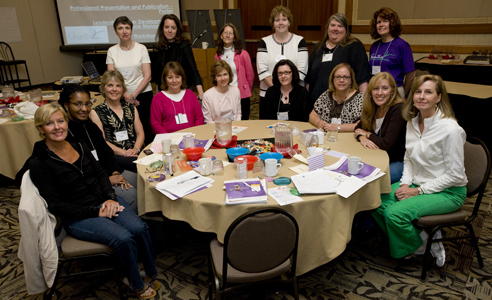 The inaugural 2008 Geriatric Nursing Leadership Academy Fellows.
The inaugural 2008 Geriatric Nursing Leadership Academy Fellows.
In an effort to improve care for older adults, the John A. Hartford Foundation funded the Geriatric Nursing Leadership Academy (GNLA) in 2008. While other Hartford leadership initiatives have focused on academics and researchers, this initiative prepares nurse leaders who work in clinical environments, such as hospitals and long-term care settings. Nurses who assume management positions in clinical settings often lack the skills to effectively lead interdisciplinary teams of health professionals to shape the delivery of care in their institutions.
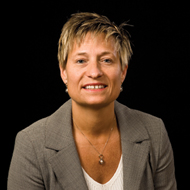
Mary Rita Hurley, Director
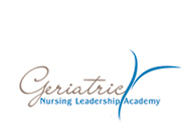
Geriatric Nursing Leadership Academy
www.nursingsociety.org
The Hartford Geriatric Nursing Leadership Academy provides nurse leaders with the formal training, mentorship, peer networking, and the sense of authority needed to enact change in the way care is delivered to older Americans. The Academy is administered by the Honor Society of Nursing, Sigma Theta Tau International whose mission is to support the learning, knowledge, and professional development of nurses committed to making a difference in health worldwide. The Academy is under the leadership of Mary Rita Hurley, MPA, RN, Ageing Initiatives Director, in partnership with the nine Hartford Centers of Geriatric Nursing Excellence.
“Nurse leaders can have great ideas and want to move projects forward,” says Ms. Hurley, “but if they don’t have communication, interpersonal, and leadership skills, they’re not going to get their ideas off the ground.”
“This stellar program provides an avenue to promote and develop nurses who can make a difference in geriatrics from the bedside to the board room,” says Patricia E. Thompson, EdD, RN, Chief Executive Officer, Sigma Theta Tau International. “Providing nurses with the knowledge and skills to be leaders will allow them to effect system-wide change to improve care for older adults.”
Fostering Nurse Leaders in Clinical Practice
The Geriatric Nursing Leadership Academy was inspired by Sigma’s successful Johnson & Johnson-funded Maternal-Child Health Leadership Academy. This mentored leadership development experience prepares and positions nurses to influence practice and patient outcomes of mothers and their children.With a planning grant provided by the Hartford Foundation in March 2006, Sigma Theta Tau and the directors of the Hartford Centers of Geriatric Nursing Excellence evaluated the leadership development content of the Maternal-Child Health Leadership Academy and used it as a template to create a leadership academy focused on the needs of older adults in health care settings. They developed a curriculum using geriatric case studies and scenarios and other leadership content to prepare nurse leaders in a variety of clinical settings. In designing the content of the formal training provided to Geriatric Nursing Leadership Academy Fellows, the program developers incorporated the leadership model created by James Kouzes and Barry Posner in their book The Leadership Challenge. This model delineates five practices of exemplary leadership—model the way, inspire a shared vision, challenge the process, enable others to act, and encourage the heart.
A 2008 implementation grant from the Hartford Foundation provides funding for the first two cohorts of the Geriatric Nursing Leadership Academy. During the 18-month Academy, each Fellow is paired with a local mentor to put into action a quality improvement project in their practice setting. Additionally, faculty from an established clinical or academic geriatric center (e.g., one of the Hartford Centers) advises each participant. The Academy begins with a four-day intensive leadership workshop. Following this training, the Fellows, together with their mentors, design a project to improve the delivery of care to older adults in their institution. Examples include a fall prevention program, a geriatric resource nurse model, alternatives to personal alarm systems in long-term care, and a program to integrate geriatric excellence into the emergency department.
A host of resources are offered to the GNLA Fellows: monthly online learning activities and discussion groups, site visits from their mentors, and multi-day implementation and evaluation workshops.
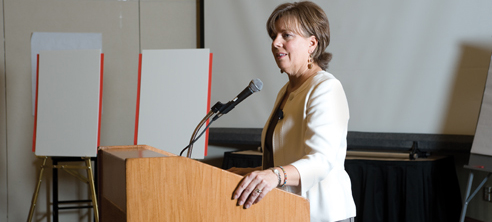
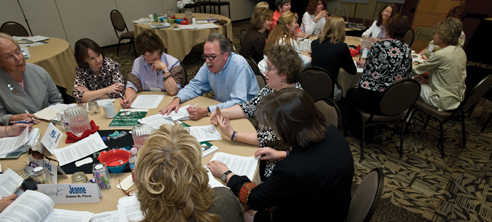 Dr. Deborah Cleeter, Leadership Consultant, addressing the Fellows.Deborah Cleeter, EdD, MSN, GNLA Leadership Consultant, offers, “The Academy has established an experiential framework for the Geriatric Nursing Leadership Fellows to develop their personal skills, create a significant impact on patient care outcomes, lead interdisciplinary teams, and effect organizational change within their institutions.”
Dr. Deborah Cleeter, Leadership Consultant, addressing the Fellows.Deborah Cleeter, EdD, MSN, GNLA Leadership Consultant, offers, “The Academy has established an experiential framework for the Geriatric Nursing Leadership Fellows to develop their personal skills, create a significant impact on patient care outcomes, lead interdisciplinary teams, and effect organizational change within their institutions.”The inaugural Geriatric Nursing Leadership Academy was launched in June 2008 with the first workshop, “The Leader Within: Defining Your Passion.” A subsequent workshop was held in February 2009. The Academy will culminate in a presentation of participants’ completed projects at Sigma Theta Tau International’s Biennial Convention in November 2009.
Gena Edmiston, BSN, RN, Executive Director of the Denali Long Term Care Center—the only nursing home in Fairbanks, Alaska—will present her project, “Achieving Resident Centered Care Goals through Strengthened Bedside Leadership.” Even now, before the completion of her project, Ms. Edmiston declares that the impact of the GNLA is already apparent at her institution. “This project has taught me to rethink leadership and to have profound respect for it,” she says.
“We’re helping nurses who work with older adults and are already in a leadership position within their practice setting to hone their leadership skills,” says Ms. Hurley. Ultimately, the goal is that these budding leaders will continue to be promoted, will embed geriatric models and best practices in their institutions, and will mentor future leaders.
“We want to influence geriatric health care practices within a variety of settings and improve geriatric health outcomes through leadership and the enactment of evidence-based care, then disseminate this information widely so we can improve the health care of older adults,” says Ms. Hurley.
Several of the Fellows are already expanding their projects into research studies. The research will be disseminated via Sigma Theta Tau’s Web site. As one of the largest nursing organizations in the world, Sigma Theta Tau has the ability to disseminate information to over 130,000 active members in 90 countries.
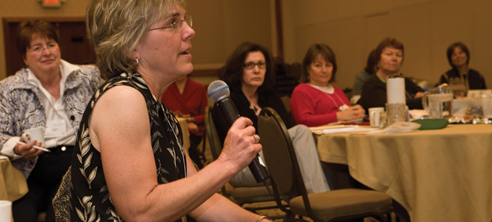
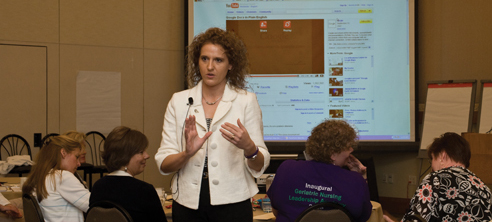 (Top) Leadership Academy Fellow, Gena Edmiston, participating in a health care media discussion.
(Top) Leadership Academy Fellow, Gena Edmiston, participating in a health care media discussion.
(Bottom) Media consultant, Sandra Davidson, giving a presentation to Fellows titled "Leading Health Care in the Digital Age."
Lessons Learned
Because funding for this project was preceded by a one-year planning grant and builds on Hartford leadership initiatives and the expertise of faculty in the Hartford Centers of Geriatric Nursing Excellence, important lessons have already been learned.“Regardless of the health care setting and the resources, good leaders can emerge when structure, support, and knowledge are provided,” says Ms. Hurley. She understands that participants must know themselves before they can be an effective leader. Each must recognize his or her potential to shape the delivery of health care; each must answer the call to leadership. And thus, the first workshop was designed to help participants learn about themselves and their leadership style.
Another finding is the overwhelming demand for this type of program. For the first cohort, 55 applications were received for 16 Fellowships.
Outcomes
As a result of the first cohort of GNLA Fellows, 16 projects to improve the health care of older adults have been implemented in 16 organizations representing 13 states.Examples of project outcomes include: required aging sensitivity training for all staff at a major medical center in Detroit and increased utilization of a geriatric specialist at a hospital and trauma center in San Francisco. There have also been unanticipated benefits, such as a mentor who now incorporates aging materials in her nursing curricula, enabling future nurses to have the skills to provide quality care to older adults.
Collaboration with Other Funders
The Geriatric Nursing Leadership Academy was created as a partnership among the Hartford Foundation, Sigma Theta Tau, the home institutions of the participants, and the Northwest Health Foundation. Hartford funding is leveraged through three mechanisms. Sigma Theta Tau provides matching support and employers provide critical release time and pay for travel of scholars.As a partner, the Northwest Health Foundation funds three GNLA Fellows from Oregon to develop a local cohort of leaders who can make change. The Northwest Health Foundation became interested in the Academy because of the opportunity to promote leadership within the long-term care community. The three Oregon Fellows have come together with their mentors, foundation staff, and a leadership consultant to work on issues outside of the formal GNLA meetings.
“We are developing the advocacy and policy skills of nurses statewide to participate in the many health and health care issues facing the state,” says Judith Woodruff, Program Director, the Northwest Health Foundation. “Having three geriatric nurses who can speak to policy makers and influence decision-making will be an asset as we move forward with our strategic plans.”
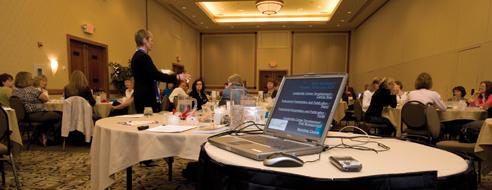 Kathleen Burke, PhD, RN, Practice Assistant Professor of Nursing at the University of Pennsylvania, presents at the 2009 Academy.
Kathleen Burke, PhD, RN, Practice Assistant Professor of Nursing at the University of Pennsylvania, presents at the 2009 Academy.
Next: Profile in Leadership
A Tremendous Desire To Make A Difference
Kathy Wright, MSN, RN ›
